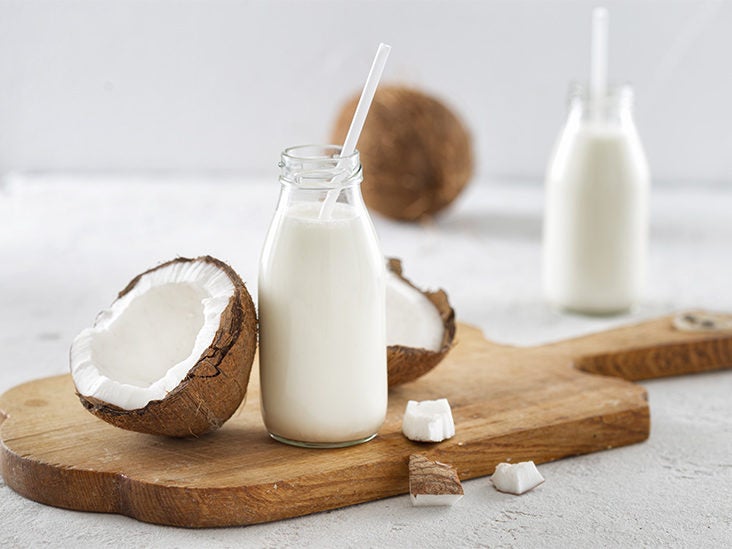Coconut milk is a delicious and creamy plant milk that may be used in cooking and hot drinks due to its adaptability. It has a multitude of health advantages and is often found in supermarkets.
How is Coconut Milk made?
Coconut milk is made by finely grating mature, fresh coconut flesh and combining it with water, creating an opaque, snow-white milk. This milk is then treated with high heat to increase its shelf-life and reduce the risk of spoilage.
Sometimes, stabilisers and/or emulsifiers such as guar gum can be added to the milk, to reduce the natural separation that can occur between the water and the fattier grated coconut flesh.
When you open a fresh coconut, the clear liquid that flows is coconut water, not coconut milk. Coconut water is often obtained from young coconuts, rather than mature coconuts where is flesh is sweet and rich enough to be turned into coconut milk.
What is the difference between coconut milk from a can and coconut milk from a carton?
Canned coconut milk is a thick and rich liquid, primarily used for creating a creamy base in recipes, and is the version that comes to mind when initially thinking about coconut milk.
Canned coconut milk is highly concentrated, making it ideal for creating a rich base in so many dishes, but do bear in mind that the fat content is high, so consume in sensible moderation.
Lower or reduced fat canned coconut milk is available, but won’t give the richness of full fat coconut milk. Canned coconut milk has a long shelf-life, and can be stored at ambient/ room temperature before use.
Coconut milk in a carton is a thinner liquid with a higher amount of added water, making it perfect for adding into hot drinks, pouring over cereals, baking, and as an everyday alternative to cow’s milk.
It is often fortified with additional vitamins and minerals including calcium, D2 and vitamin B12 so you can be assured you are enriching your body with all the good stuff!
Coconut milk from the carton is found in supermarket chillers, and is also available as a long life version on the ambient shelves, from popular brands including Koko, Alpro, Plenish, and Rude Health in the UK. Look out for no added sugar varieties.
Which coconut milk do you use for a curry?
For the perfect creamy vegan curry, use canned coconut milk, full-fat for the best richness (unless you’re on a calorie or fat-controlled diet).
If your coconut milk has been stored at a cooler temperature, you may find that the liquid and creamier part has separated, so simply give the can a good shake before opening.
The two parts will also combine again fully when heated in your recipe. Canned coconut milk can vary with the additives used, some containing additional stabilisers, thickeners and emulsifiers to stop separation, so always check the ingredients list on the label if you are reducing your intake of additives.
The current price of 400g canned coconut milk is between 70p-£3 depending on price and retailer.
Can you freeze coconut milk?
If you’ve got some canned coconut milk left over and don’t want to waste it, simply pour it into an ice cube tray and freeze it for up to 3 months. You can then simply use the coconut milk from frozen by ‘popping’ it into curries, or blend into a smoothie, or frozen vegan dessert with fruit.
Dishes made from coconut milk including curries and soups can be fully cooled and frozen for 2-3 months, making it a perfect ingredient for batch cooking.
Coconut milk from a carton may not freeze as well, often becoming grainy when defrosted, so it’s best to use it all up while fresh.
Coconut cream vs coconut milk- what are the differences?
Similarly to other types of cream and milk, coconut cream has a much higher fat quantity than coconut milk, and a thicker, more solid texture. You can buy coconut cream in small cans, perfect for whipping into a dessert cream, spooning into a Pina Colada, or for churning into a coconut ice cream.
It is rich in flavour and texture, so a little goes a long way. If you don’t have a can of coconut cream available, simply refrigerate a can of coconut milk and scoop out the solid cream that separates from the liquid- whip or spoon into a creamy treat!
Apart from curries, what else can coconut milk be used for?
Alongside making incredible Thai and Indian- style curries, coconut milk can be used to transform many other dishes from something simple to something spectacular!
Add a can of coconut milk to homemade soup, for the silkiest bowlful- especially roasted pumpkin or carrot and coriander.
It also makes a delicious base for homemade noodle bowls, or it can be blended with roasted butternut squash and sage for a rich vegan mac ‘n’ cheese sauce.
If you love creating desserts, canned coconut milk makes the most incredible vegan panna cotta when combined with agar flakes and vanilla, or get nostalgic and bake it into a slow-cooked vegan rice pudding.
Thin coconut milk from a carton can be used in place of any plant or cow’s milk, in hot drinks (and it won’t curdle!), bechamel sauce, in porridge. It’s also delicious added to a healthy morning smoothie to make it creamy and filling.
Is coconut milk good for you?
There has been much research into the benefits of coconut milk (and other coconut products) over recent years, and the many positive health benefits have been recognised1.
Coconut milk is high in high in calories, meaning it can provide sustainable energy for activities throughout the day.
Coconut milk contains medium-chain fatty acids, which are considered a healthier saturated fat due to being oxidised quickly by the liver. Like all fats, they should be considered in moderation, but remain an important part of the diet.
One of the most valuable medium-chain fatty acids in coconut milk is lauric acid, which is thought to be beneficial to skin health. It also has anti-inflammatory and antimicrobial properties to support your body fight infection.
Carton coconut milk is often enriched with added vitamins and minerals, including vitamin B12 and calcium, making it a healthy and balanced choice.
How many calories are there in coconut milk?
There are around 145 calories in 100ml of full-fat canned coconut milk, and around 65 calories per 100ml of reduced fat canned coconut milk.
100ml of typical coconut milk from the carton offers around 15 calories, compared with 60 calories per 100ml of barista-style oat milk, and 39 calories in 100ml of sweetened soya milk.
If you are not allergic to coconut or have a heightened sensitivity to tree nuts, coconut milk is unlikely to cause any noticeable negative effects.
One should limit the amount of full-fat canned coconut milk ingested by those who feel digestive discomfort after eating items with greater fat content.
When following a low-fat or calorie-restricted diet, coconut milk in cans should be used in moderation.
References
Karunasiri, A. N., Gunawardane, M., Senanayake, C. M., Jayathilaka, N., & Seneviratne, K. N. (2020). Antioxidant and Nutritional Properties of Domestic and Commercial Coconut Milk Preparations. International journal of food science, 2020, 3489605. Available at: https://doi.org/10.1155/2020/3489605 [accessed 11 October 2022]




